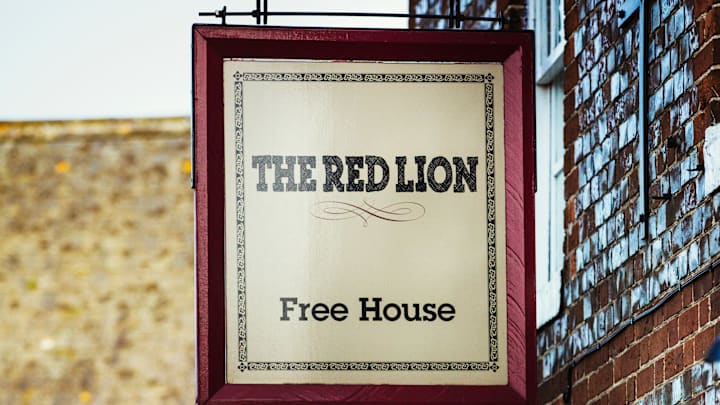Should you find yourself in the United Kingdom and are told to meet someone at The Red Lion, you’re going to have a fair amount of trouble. According to Food & Wine, more than 500 pubs in the UK share that name—roughly 20 in London alone. That’s a lot of Red Lions. So what’s with the fascination?
For an answer, you have to travel a few hundred years into the past and brush up on your British monarchies. Specifically, King James VI of Scotland, who became King James I of England in 1603 and held a bit of a grudge against the country for their harsh treatment of his mother, Mary, Queen of Scots. (Suspected of trying to overthrow Queen Elizabeth I, Mary was beheaded.)
When James took the throne, he wanted to make it explicitly clear that it was a Scot who was in control. To do that, he ordered some visual cues. In the UK, buildings deemed to be of significance were to display the red lion of Scotland at their entrance. That included watering holes. Thus, practically every pub was a “red lion” pub.
The lion is part of the Royal Banner of the Royal Arms of Scotland, otherwise known as the Lion Rampant. In use since the 1200s in Scotland, it was incorporated into the Royal Arms of England once James took control.
That’s not the only reason so many pubs hung a character sign outside their doors. From the 12th century, British pubs as well as other storefronts used imagery to inform illiterate customers of their wares. In the case of pubs, that meant illustrations of brewing components like hops.
The red lion mandate, by the way, was not King James’s only bit of eccentricity. In Scotland, he was preoccupied with prosecuting witches, whom he believed responsible for a potent storm that threatened the life of his new bride, Anne of Denmark. Roughly 2500 women believed to be witches were executed during the Scotland witch trials. James also sponsored the circulation of a new English edition of the Christian Bible, which became known as the King James Bible.
[h/t Food & Wine]
